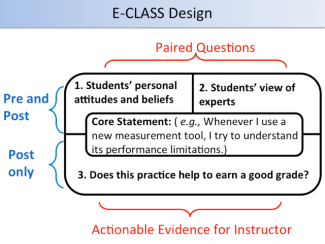We have developed three assessment tools for evaluating undergraduate physics lab courses:
The E-CLASS was developed as a broadly applicable assessment tool for undergraduate physics lab courses. At the beginning and end of the semester, the E-CLASS assesses students' views about their strategies, habits of mind, and attitudes when doing experiments in lab classes.
The Modeling Assessment for Physics Laboratory Experiments (MAPLE) is an assessment that has been developed to measure students' processes of modeling in Advanced Lab classes focusing on either Electronics or Optics.
Currently under development, SPRUCE will measure student learning connected to measurement uncertainty at the introductory undergraduate level in the context of experimental physics.



 The Physics Frontiers Centers (PFC) program supports university-based centers and institutes where the collective efforts of a larger group of individuals can enable transformational advances in the most promising research areas. The program is designed to foster major breakthroughs at the intellectual frontiers of physics by providing needed resources such as combinations of talents, skills, disciplines, and/or specialized infrastructure, not usually available to individual investigators or small groups, in an environment in which the collective efforts of the larger group can be shown to be seminal to promoting significant progress in the science and the education of students. PFCs also include creative, substantive activities aimed at enhancing education, broadening participation of traditionally underrepresented groups, and outreach to the scientific community and general public.
The Physics Frontiers Centers (PFC) program supports university-based centers and institutes where the collective efforts of a larger group of individuals can enable transformational advances in the most promising research areas. The program is designed to foster major breakthroughs at the intellectual frontiers of physics by providing needed resources such as combinations of talents, skills, disciplines, and/or specialized infrastructure, not usually available to individual investigators or small groups, in an environment in which the collective efforts of the larger group can be shown to be seminal to promoting significant progress in the science and the education of students. PFCs also include creative, substantive activities aimed at enhancing education, broadening participation of traditionally underrepresented groups, and outreach to the scientific community and general public.